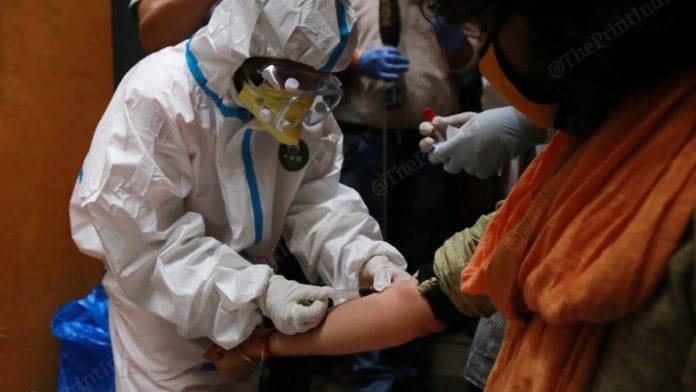New Delhi: Indian health experts have admitted science has answered few questions on the Covid-19 pandemic so far, and “unknowns about the virus exceed known” even today.
In an editorial published in the Indian Journal of Medical Research (IJMR), a peer-reviewed medical journal by the Indian Council of Medical Research (ICMR), top health experts Dr Priya Abraham and Dr Rajesh Bhatia said the “efficacy of vaccines” also remains uncertain.
Abraham is the director at Pune-based National Institute of Virology (NIV), an institute under the ICMR, while Bhatia is a former director of communicable diseases, World Health Organization, South East Asia.
“Combating the pandemic shall require complete understanding of the virus, its pathogenesis, epidemiological and clinical dimensions, and availability of safe and efficacious therapeutic and prophylactic tools especially for vulnerable and high risk populations,” said the editorial, titled ‘The enigmatic COVID-19 pandemic’, published on 5 September.
It added, “Answers to these research questions may get us closer to having reliable and affordable pharmaceutical and non-pharmaceutical interventions.”
Also read: Ex-health secy Preeti Sudan, who led Covid war, now on global panel for pandemic preparedness
Immune response of Covid-19 vaccines uncertain
According to the authors, Covid-19’s “duration of persistence of protective immunity remain elusive till date”.
“The uncertainty of long-term immune response has potential implications for the efficacy of vaccines,” they added.
Till now, vaccines are being considered as the ultimate intervention to contain the pandemic.
However, the editorial noted that “the real impact of vaccines on this pandemic will become evident only once it has been widely in use for a few months in different populations”.
The editorial elaborated on the globally “accelerated” race to find vaccines, and also mentioned Sputnik V — Russia’s proposed Covid-19 vaccine that induced an antibody response in all participants in early trials with no serious adverse effects.
“Currently, there are about 165 different candidate vaccines for COVID-19 being developed around the world and several of these are in different phases of clinical trials,” the authors noted.
Also read: Why people from Russia, Poland and Hungary don’t want a Covid-19 vaccine
Progress under Millennium Development Goals pushed back
According to Abraham and Bhatia, the pandemic has also pushed back progress made under the Millennium Development Goals (MDGs) and is hampering the ambitious United Nations Sustainable Development Goals.
The MDGs were eight international development goals formed by the UN, which included targets such as halving extreme poverty rates to halting the spread of HIV/AIDS and providing universal primary education, till the target year of 2015.
The UN also adopted 17 Sustainable Development Goals (SDGs) in 2015 as a universal call to action to end poverty, protect the planet and ensure all people enjoy peace and prosperity by 2030.
“It is still not clear as to how the global community will make up for the pandemic-induced setback to its critical operations of major disease elimination programmes such as for tuberculosis,” the editorial noted.
Also read: Rising Covid cases fill up ventilator beds, but here’s why doctors say Delhi needn’t worry yet






